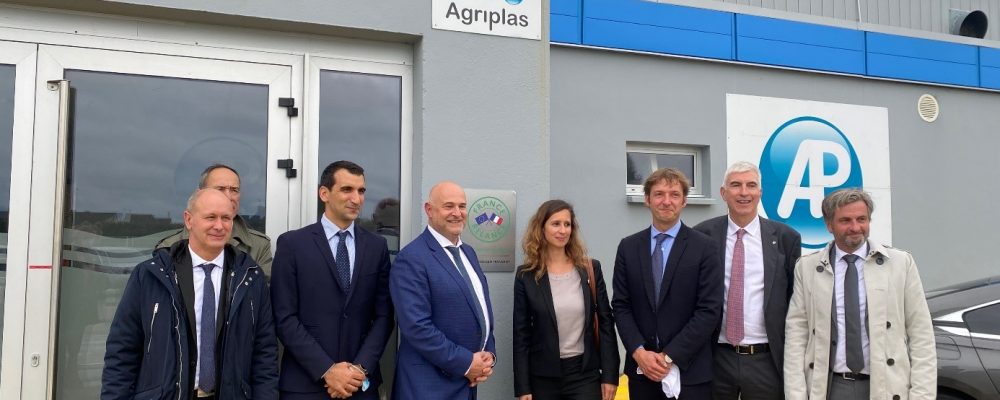Agriplas Sotralentz Packaging is a winner in the ORPLAST (Objectif Recyclage PLASTiques) call for plastic recycling projects launched by ADEME and the French Ministry for Ecological Transition as part of the France Relance national recovery plan. A France Relance plaque was unveiled at the Dinard production plant during a visit by Laurent Pietraszewski, the Secretary of State for Pensions & Occupational Health at the Ministry of Labour, Employment and Economic Inclusion.
A project selected by ADEME’s ORPLAST scheme; we chart the history of this flagship Recycled Raw Materials (RRM) repurposing project.
The ADEME ORPLAST (Objectif Recyclage PLASTiques) – scheme provides financial support for plastics manufacturers committed to integrating recycled plastics by overcoming the current technical constraints around adapting production systems to use RRM.
The solution adopted by Agriplas Sotralentz Packaging in 2018 is one of the four projects selected by ADEME (the French Environment and Energy Management Agency) for inclusion in the national plan. The funding provided by ADEME will support the design work and capital investment required to increase the proportion of recycled plastic incorporated in a range of small bottle and jerrycan products.
To be precise, the grant awarded to Agriplas Sotralentz Packaging will be used to fund:
- The installation of 3-layer extrusion heads for the 20-22L machines (RRM for the middle layer / new PM for each outer layer)
- An RRM storage silo
- New machines equipped with multi-layer heads
- A range of quality control devices
The project will also have other positive impacts, including improving the company’s manufacturing competitiveness, strengthening the local ecosystem, developing the skills of operators, and reducing the company’s dependence on non-renewable resources.
An ambitious target: to achieve 25% conversion to RRM by 2025
The teams at Agriplas Sotralentz Packaging have been working since 2018 on incorporating more RRM in its 3 production plants in Dinard, Bellegarde and Drulingen. The Agriplas management team is in no doubt that projects that contribute to building a circular economy for the plastics industry make good sense, and can even be levers for growth, especially since the introduction of AGEC, the French Anti-waste and Circular Economy legislation. This is why the company is working on the introduction of closed-loop recycling for its 20-22L jerrycan products.
As part of accelerating the replacement of new packaging materials with those containing RRM, Agriplas-Sotralentz Packaging embarked several months ago on the process of obtaining approval for its RRM packaging products to be used for the transport of dangerous goods, the company’s core market.
Addressing multiple challenges with an ambitious approach to R&D
Agriplas-Sotralentz Packaging faces many challenges in achieving its goal of incorporating more RRM into its products:
- Mechanical strength and resistance to chemicals
- The presence of VOCs (Volatile Organic Compounds)
- Sourcing difficulties, etc.
To improve the industrial properties of packaging containing RRM, Agriplas-Sotralentz Packaging made the decision to involve all its teams (R&D, operations, standards and approvals, quality, purchasing, etc.) in identifying viable solutions short- and long-term solutions.
One of the first is to manufacture packaging in three layers, where one layer of recycled HDPE is sandwiched between two layers of new HDPE. Packaging produced using this method can contain up to 70% recycled material, and can itself be recycled via the usual sorting channels. Which is why the manufacturing department has chosen to invest in multi-layer extrusion heads and new extrusion blow moulding machines with this function. The majority of the ORPLAST grant will be used to fund these capital investments.
The second area of improvement for the packaging manufacturer focuses on recycled material quality. For this purpose, a large number of tests have been conducted with different suppliers of flakes and granules produced from recycled household, industrial and commercial packaging waste. The tests also showed that optimised regranulation (with degassing) and sterilisation of these recycled materials made it possible to create packaging materials whose quality is high enough for accreditation and certification. Material upgraded in this way can then be incorporated without compromising the performance of the resulting packaging products.
Alongside the capital investment made possible by the ORPLAST scheme, the company itself has also financed a regranulation line (installed this July) and a sterilisation line (currently being installed) at its Drulingen plant to control this key stage of production.
Caption : The ‘France Relance’ plaque was unveiled at a ceremony attended by Laurent Pietraszewski, Secretary of State for Pensions & Occupational Health at the Ministry of Labour, Employment and Economic Inclusion, Thibaud Durand, CEO of Agriplas Sotralentz Packaging, Arnaud Salmon, Mayor of Dinard, Pascal Guichard, Chairman of the Joint Communities Authority, Jean-Luc Bourgeaux, Member of the French Parliament, Marie Wencker, sub-prefect for Recovery, Jérémie Lecha, CEO of Groupe Roullier, and Jean-Christophe Piot, Innovation Funding Director of Groupe Roullier.
